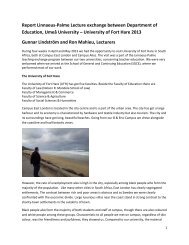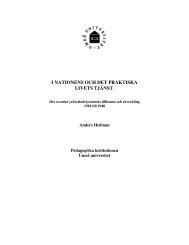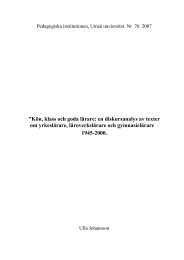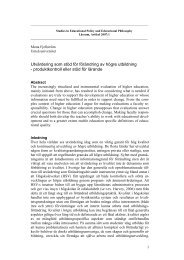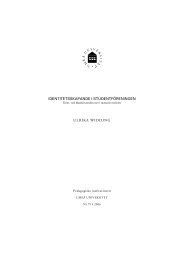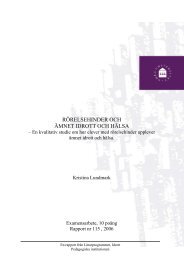Är det alltid rätt person som vinner? - DiVA
Är det alltid rätt person som vinner? - DiVA
Är det alltid rätt person som vinner? - DiVA
You also want an ePaper? Increase the reach of your titles
YUMPU automatically turns print PDFs into web optimized ePapers that Google loves.
Johansson, Annika. <strong>Är</strong> <strong>det</strong> <strong>alltid</strong> <strong>rätt</strong> <strong>person</strong> <strong>som</strong> <strong>vinner</strong>? Bedömningarnas<br />
reliabilitet och validitet inom bedömningssporterna acroski och rytmisk<br />
gymnastik. (Is it always the right <strong>person</strong> that wins? The reliability and<br />
validity of the judgements in the judging sports acroski and rhythmic<br />
gymnastics.) Dissertation for the Licentiate Degree of the Faculty of Social<br />
Sciences, University of Umeå, Sweden, 2001. (In Swedish with a summary<br />
in English). ISBN 91-7305-110-1, ISSN 0283-9997<br />
ABSTRACT<br />
Did the right <strong>person</strong> win? In competitive sports the difference between<br />
winning and loosing can be very marginal but still the result will have a big<br />
impact. To finish second, even if it is an Olympic Game, can be felt like a<br />
failure for the athlete. In the light of this the quality of the measurements<br />
and the judgements in sports are an extremely important issue. In this<br />
dissertation, consisting of two separate reports and one summary report, the<br />
freestyle discipline, acroski, and the gymnastic discipline, rhythmic gymnastics<br />
(RG) where studied with a focus on the rules and judgements in the<br />
sports. The reliability and validity of the rule and judging systems were<br />
analysed together with changes in the rule and judging systems. The reliability,<br />
as the judges ability to interpret the rules and judge in a consistent way,<br />
and validity in the sense that the judgements, and the rules for the judgements,<br />
where in accordance with the idea of the sport. Information was<br />
gathered from rulebooks, judging manuals, meeting protocols, and historical<br />
documents. For information on how the rules and judgements where perceived<br />
among people involved in the two sports, interviews where carried<br />
out with two coaches, two judges and four athletes from each of the sports.<br />
In the summary report the results from the two reports where discussed and<br />
a comparison of the rule systems and judgements was made together with a<br />
discussion about reliability and validity problems in sports measured by<br />
time, length and height. The results showed that the rule and judging<br />
systems in acroski and RG in a short time have gone through major changes<br />
to increase the reliability and validity in the judgements. The quick evolution<br />
of these sports seems to be the main reason for these changes but also<br />
other factors where of vital importance. Finding the balance between<br />
making the judgements as objective as possible, without loosing the idea of<br />
the sport, together with the quick evolution of the sports, seemed to be the<br />
main challenges in the rule and judging systems of acroski and RG.<br />
Key words: judgement, judging, measurements, sport, validity, reliability



